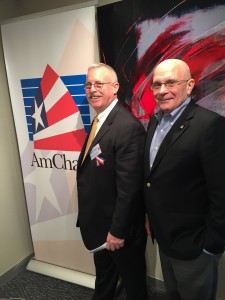I am pleased to announce that I will be moderating a panel at a GCR Live Cartels conference sponsored by Global Competition Review on Tuesday, 5 April at One CityCenter, Washington D.C. My panel is titled: The U.S. Antitrust Sentencing Guidelines: Too Harsh, Too Lenient, or Just About Right? The panel is part of a one-day event, co-chaired by Phillip Warren, Covington & Burling, and Dennis Carlton, Compass Lexecon will bring together leading private practitioners, corporate counsel and governmental representatives to discuss a variety of topics at the forefront of antitrust law.
Three of my co-panelists are people I know well and who have a great deal of experience with antitrust sentencing and the sentencing guidelines. They are John Connor [Expert Economist at OnPoint Analytics, Inc.]; Megan Dixon [Partner, Hogan Lovells] and Jeffrey Martino, Chief of the Antitrust Division’s New York Field Office. And, we are fortunate that Alan Dorhoffer, Deputy Director, Office of Education for the United States Sentencing Commission will be joining us.
Antitrust sentencing guideline reform has been a major interest of mine. I’ve written about it several times (here) (here) and have submitted comments to the Sentencing Commission (here). Some of the issues I expect we will be discussing/debating are:
- Is the volume of commerce adjustment for individuals too harsh and too disconnected from culpability to be useful?
- Why is it so a rare for an antitrust individual defendant to be sentenced within the guidelines range?
- Are the corporate fines too high, especially in light of private damage actions and enforcement actions by other competition agencies? or,
- Are the corporate guidelines too low and not sufficient to provide adequate deterrence?
- Should the sentencing guidelines be amended so that a corporation can get credit for a bona fide antitrust compliance program even if senior executives are involved in the wrongdoing?
The GCR Cartel program will also include the following panels:
- Session one: Punishing global cartels – are there any limits? with María Luisa Tierno Centella, European Commission
- Keynote address: Eric Holder, Covington and Burling and Former U.S. Attorney General
- Session two: Did the enforcers go bananas in Dole v. Commission? What are the boundaries of cartel conduct – and why does it matter? with Brent Snyder, US Department of Justice
- Session three: Et tu?: Where are private cartel actions in Europe headed? with Hon. Justice Peter Roth, Competition Appeal Tribunal
- Session four: – Cartel enforcement challenges in newer enforcement regimes with Alejandra Palacios Prieto, Mexican Federal Economic Competition Commission
- Session five: Managing the challenge of global antitrust compliance
The conference will include a networking lunch and then a cocktail reception to conclude the event. Tickets can be purchased here.

